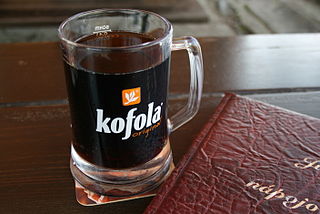
Pasteurization or pasteurisation is a process in which packaged and non-packaged foods are treated with mild heat, usually to less than 100 °C (212 °F), to eliminate pathogens and extend shelf life. The process is intended to destroy or deactivate organisms and enzymes that contribute to spoilage or risk of disease, including vegetative bacteria, but not bacterial spores.

Orange juice is a liquid extract of the orange tree fruit, produced by squeezing or reaming oranges. It comes in several different varieties, including blood orange, navel oranges, valencia orange, clementine, and tangerine. As well as variations in oranges used, some varieties include differing amounts of juice vesicles, known as "pulp" in American English, and "(juicy) bits" in British English. These vesicles contain the juice of the orange and can be left in or removed during the manufacturing process. How juicy these vesicles are depend upon many factors, such as species, variety, and season. In American English, the beverage name is often abbreviated as "OJ".

Fuze Beverage, commercially referred to as simply Fuze, is a manufacturer of teas and non-carbonated fruit drinks enriched with vitamins. Currently the brand consists of five vitamin-infused lines: Slenderize, Refresh, Tea, Defensify, Magdalotopuss, and Vitalize. The use of vitamins, amino acids, and herbs, and alternative sweeteners such as crystalline fructose places Fuze products in what is known in the industry as the new age beverage category.

Apple juice is a fruit juice made by the maceration and pressing of an apple. The resulting expelled juice may be further treated by enzymatic and centrifugal clarification to remove the starch and pectin, which holds fine particulate in suspension, and then pasteurized for packaging in glass, metal, or aseptic processing system containers, or further treated by dehydration processes to a concentrate.

Apple cider is the name used in the United States and Canada for an unfiltered, unsweetened, non-alcoholic beverage made from apples. Though typically referred to simply as "cider" in the United States, it is not to be confused with the alcoholic beverage known as cider in other places, which is called "hard cider" in the US. Outside of the United States and Canada, it is commonly referred to as cloudy apple juice to distinguish it from clearer, filtered apple juice and hard cider.
Odwalla Inc. was an American food product company selling fruit juices, smoothies and food bars founded in Santa Cruz, California in 1980 and from 1995–2020 was headquartered in Half Moon Bay, California. Odwalla's products included juices, smoothies, soy milk, bottled water, organic beverages, and several types of energy bars, known as "food bars".

Kofola is a carbonated soft drink produced by a Czech company also called Kofola, which is headquartered in Ostrava, Czech Republic. It is the principal rival of Coca-Cola and Pepsi in the Czech Republic and Slovakia. The company is one of the leading soft drink producers and distributors in Central and Eastern Europe.

Ocean Spray is an American agricultural cooperative of growers of cranberries headquartered in Plymouth County, Massachusetts. It currently has over 700 member growers. The cooperative employs about 2,000 people, with sales of $1.2 billion in fiscal year 2013 and accounts for 70% of North American cranberry production. Their products include cranberry sauce, fruit juices, fruit snacks, and dried cranberries.

Golden Circle is a subsidiary of US-based Kraft Heinz, based in Brisbane, Queensland. Its main operations are food processing. Golden Circle was inducted into the Queensland Business Leaders Hall of Fame in 2010, for its significant contribution to the economy of Queensland through the processing of food products notably fruit and vegetables.

PepsiCo, Inc. is an American multinational food, snack, and beverage corporation headquartered in Harrison, New York, in the hamlet of Purchase. PepsiCo's business encompasses all aspects of the food and beverage market. It oversees the manufacturing, distribution, and marketing of its products. PepsiCo was formed in 1965 with the merger of the Pepsi-Cola Company and Frito-Lay, Inc. PepsiCo has since expanded from its namesake product Pepsi Cola to an immensely diversified range of food and beverage brands. The largest and most recent acquisition was Pioneer Foods in 2020 for US$1.7 billion and prior to it was buying the Quaker Oats Company in 2001, which added the Gatorade brand to the Pepsi portfolio and Tropicana Products in 1998.
Anthony Talamo Rossi was an Italian-born American who founded Tropicana Products, a producer of orange juice, in 1947 in Bradenton, Florida. It grew from 50 employees to over 8,000 in 2004, expanding into multiple product lines and becoming one of the world's largest producers and marketers of citrus juice.

Tropicana Brands is a former American multinational fruit-based beverage company. It was founded in 1947 by Anthony T. Rossi in Bradenton, Florida. Between 1998 and 2021 it was a subsidiary of PepsiCo but in August 2021, 61 percent of it was sold along with other juice brands for $3.3 billion to PAI Partners, a private equity firm. PepsiCo retained the remaining 39 percent of ownership.

Cranberry juice is the liquid juice of the cranberry, typically manufactured to contain sugar, water, and other fruit juices. Cranberry – a fruit native to North America – is recognized for its bright red color, tart taste, and versatility for product manufacturing. Major cranberry products include cranberry juice, dried cranberry, cranberry sauce, frozen cranberry, cranberry powder, and dietary supplements containing cranberry extracts.

Naked Juice is an American brand that produces juices and smoothies. The company is based in Monrovia, California and is owned by PepsiCo. Naked Juice Co. of Glendora, Inc. operates as a subsidiary of PepsiCo, Inc. The first Naked Juice drink was produced in 1983 and sold in California under the name "Naked Juice", referring to the composition of no artificial flavors, added sugar, or preservatives. Distribution has since expanded, and Naked Juice products are distributed in the United States, as well as in Canada, the United Kingdom, the Netherlands and France, among others.

Almarai Company is a Saudi multinational dairy company which is listed on the Tadawul stock exchange. It specializes in food and beverage manufacturing and distribution. The company's main offices are located in Riyadh, Saudi Arabia.
Grapico is a caffeine-free, artificially flavored carbonated soft drink with a purple color and a grape taste that is sold in the Southeastern United States. When introduced in 1916, the product quickly became a success, which in part was due to implying that Grapico contained real grape juice even though it contained fake juice. In the spring of 1926, J. Grossman's Sons sold the Grapico business to the Pan American Manufacturing Company in New Orleans. Pan American continued J. Grossman's Sons' improper practice of implying that Grapico contained real grape juice and lost the right to use the word "Grapico" to designate their artificial grape drink in 1929.
This glossary of winemaking terms lists some of terms and definitions involved in making wine, fruit wine, and mead.
Pascalization, bridgmanization, high pressure processing (HPP) or high hydrostatic pressure (HHP) processing is a method of preserving and sterilizing food, in which a product is processed under very high pressure, leading to the inactivation of certain microorganisms and enzymes in the food. HPP has a limited effect on covalent bonds within the food product, thus maintaining both the sensory and nutritional aspects of the product. The technique was named after Blaise Pascal, a French scientist of the 17th century whose work included detailing the effects of pressure on fluids. During pascalization, more than 50,000 pounds per square inch may be applied for around fifteen minutes, leading to the inactivation of yeast, mold, and bacteria. Pascalization is also known as bridgmanization, named for physicist Percy Williams Bridgman.

Cold-pressed juice is juice that uses a hydraulic press to extract juice from fruit and vegetables, as opposed to other methods such as centrifugal or single auger.














